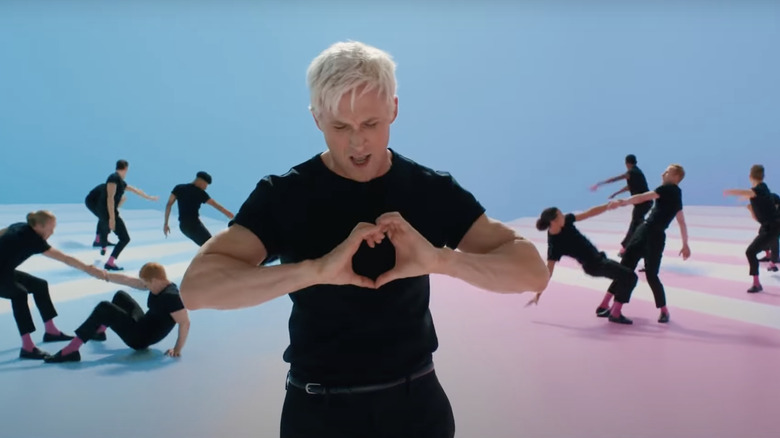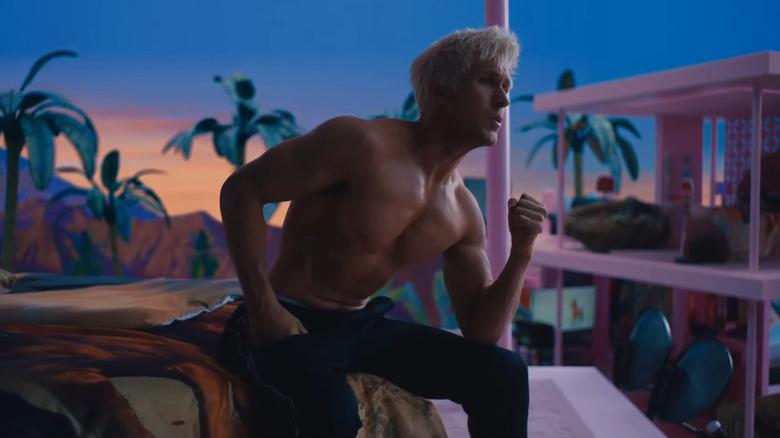Matchbox Twenty's Rob Thomas Gave Barbie His Blessing To Make Fun Of 'Push'
This article contains spoilers for "Barbie."
I'm a '90s kid. I mean, I was actually a proper child in the '90s. I turned seven in the first year of the 21st century. When most people say they are '90s kids, they really mean they were born in the '80s and had their formative coming of age years in the '90s. Consequently, my relationship to the pop culture of the decade of my birth is rather odd, as those formative years for me were really the early 2000s. Micro-generations make a big difference.
Music, in particular, is a weak spot for me. I missed out on grunge, neo-soul, gangsta rap, and so much more. My popular music awareness started forming around the time of "Millennium" by the Backstreet Boys in 1999. So, I have no nostalgia for this era of music or, quite frankly, know much of it. When I decided to go back and listen to music before my time, I went to the '60s and '70s, not the '90s.
My lack of connection to the music of this era prevented me from fully connecting with two music-focused sequences in "Barbie." The first involved the Indigo Girls' "Closer To Fine," covered by Brandi and Catherine Carlile, which plays every time Barbie drives her car. I'd never heard this song before. The second is a significant comic showcase for Ryan Gosling and his fellow Kens where they perform a cover of Matchbox Twenty's "Push," incorrectly believing they are wooing the Barbies. I'd only heard the song in passing, so while everyone around me was guffawing at the song choice, I was only lightly chuckling at the scene's intention.
Obviously, the scene is lovingly making fun of this song, but luckily for Greta Gerwig, lead singer/songwriter Rob Thomas was totally game for it.
'This is my rock 'n' roll'
One of those '80s-born people who had their formative years in the 1990s was "Barbie" co-writer and director Greta Gerwig. She was born in 1983, making her 13 years old when Matchbox Twenty dropped "Push" in 1996. That 12-16 zone for someone is crucial: every movie, every TV show, and every song that people obsess over during those years tend to imprint on them forever. For Gerwig, "Push" was a big deal at that age. She tells USA Today, "Growing up, I loved that song ... I was like, 'This is my rock 'n' roll.'"
When you're that young, though, you don't always grasp what a song means when you listen to it. You work purely off the vibes because maybe the concepts are just a bit more mature than your brain can fully grapple with. (This can also be a problem for adults. How many people out there still think Bruce Springsteen's "Born in the USA" is a patriotic anthem? Too many.) Gerwig explains that it wasn't until she went to college when she "actually thought, 'What is that song about?' Just thinking about 13-year-old me singing along and really meaning it, I was like, 'That is so interesting.'"
As for what "Push" is about, well, people have been parsing through that for the last 27 years, and not everybody likes what they find.
'A time of manufactured angst'
"Push" was the second single off of Matchbox Twenty's debut album "Yourself or Someone Like You," which went an astoundingly impressive 12x platinum in the US. It was also met with much controversy, as many took it to be a song about glorifying domestic violence and emotional abuse. I mean, the chorus has Rob Thomas triumphantly singing, "I wanna push you around/Well I will, well I will." However, Thomas claims this was never his intention. Speaking with USA Today, he recalls:
"What's funny is, I wrote that song about someone I had been with who I felt was manipulating me and taking advantage of me. The '90s was a time of manufactured angst, and nobody wanted to be a victim in a song. So in a weird twist of different times, there's something very problematic about 'Push,' if it wasn't for the innocence of how it was written."
With that lyrical content, it makes perfect sense why Ryan Gosling's Ken, who's been completely radicalized by the idea of the patriarchy (or, at least, the aesthetics of the patriarchy) sings this song to a woman he claims to love, perfectly spotlighting just how clueless he is. Thomas was up for providing the soundtrack to that ignorance, saying:
"When I got the call for 'Barbie,' they told me, 'Ken's by the fireside, he's playing the song and it's his favorite band.' So I did this thinking I'd be the butt of the joke, and I was fine with that. I'm pretty thick-skinned."
Because Gosling plays it so well, "Push" strangely endears you even more to Ken. Thomas was told as much by Atlantic Records exec Julie Greenwald ("She had just seen the movie and was like, 'You come out of it loving Ken and loving "Push."' And I was like, 'Aww. Alright, really good!'") Now that I'm more familiar with the song, I wouldn't be surprised if I join in on the guffaws on my second viewing.


